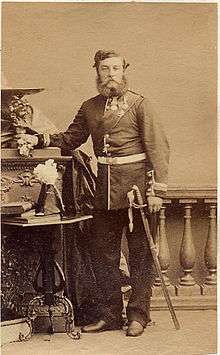John Wimburn Laurie

John Wimburn Laurie (1 October 1835 – 19 May 1912) was a soldier and political figure in Nova Scotia, Canada for thirty years and then returned to England. He was the father of George Brenton Laurie.
Military career
He was born in London, England, the son of John Laurie and Eliza Helen Collett, and educated at Harrow, Dresden and Sandhurst.[1] He entered the British Army in 1853 and served in 4th Kings Own Regiment in Crimea (1855) and Mauritius (1857) on his way to India (1858). He served in South Africa (1881). While in Nova Scotia, Laurie also served during the North-West Rebellion of 1885, at which point he was the highest-ranking officer in Canada.[2] He achieved the rank of Lieutenant General in 1887.
Nova Scotia
In 1862 he arrived in Halifax, Nova Scotia, married Frances Robie Collins (daughter of Enos Collins) in 1863 and developed Oakfield, Nova Scotia on the shores of Grand Lake. In 1863, he married Frances R. Collins. Laurie was warden for Halifax County in 1880. He was appointed Lieutenant General (1881), became an MP for Shelburne in the Canadian House of Commons (1887-1891). In 1886, he greeted James J. Bremner and the Halifax Volunteer Battalion upon their return from the Northwest Rebellion.[3] He was defeated by Thomas Robertson in the 1887 general election; Robertson's election was overturned on appeal and Laurie won the subsequent by-election later the same year. That election was declared void but Laurie was elected again in 1888. He represented Shelburne in the Canadian House of Commons from 1887 to 1891 as a Conservative member.

Laurie was a prominent freemason, serving as Grand Master for Nova Scotia and provincial grand master for South Wales.[4] During his time in Nova Scotia, he served as president of the Central Board of Agriculture. Laurie was chairman of the Canadian trade section of the London Chamber of Commerce. He was named a knight of the Order of St. Sava and of the Order of the Red Cross of Serbia.[1]
England
Although retaining Oakfield, he returned to England in 1889, and was an unsuccessful candidate for a seat in the British House of Commons in 1892.[1] He was elected a member of the British House of Commons at the next general election, representing Pembroke and Haverfordwest from 1895 to 1906.[5] He entered local politics, becoming Mayor of Paddington in 1907.
Laurie was given a coffee pot by Dr. Inglis which was a precious heirloom in Colonel Laurie's family.
Legacy
- built St. Margaret’s of Scotland Church (See Heritage Trust of Nova Scotia)
- namesake of Laurie Park, Oakfield, Nova Scotia.
See also
References
- John Wimburn Laurie – Parliament of Canada biography
- "Oakfield and its Founder [Col. John Wimburn Laurie]"; by Miss Margaret Laurie; Vol #24 (1938); pp. 15.
Endnotes
- 1 2 3 The Canadian men and women of the time a handbook of Canadian biography, HJ Morgan (1898)
- ↑ Prairie Warships: River Navigation in the Northwest Rebellion By Gordon Errett Tolton, p. 129
- ↑ https://archive.org/stream/cihm_30601#page/n29/mode/2up
- ↑ William R. Denslow, Harry S. Truman 10,000 Famous Freemasons from K to Z Part Two (2004) ISBN 1-4179-7579-2
- ↑ http://hansard.millbanksystems.com/people/mr-john-laurie HANSARD 1803–2005 → People
External links
| Parliament of the United Kingdom | ||
|---|---|---|
| Preceded by Charles Francis Egerton Allen |
Member of Parliament for Pembroke and Haverfordwest 1895 – 1906 |
Succeeded by Sir Owen Cosby Philipps |